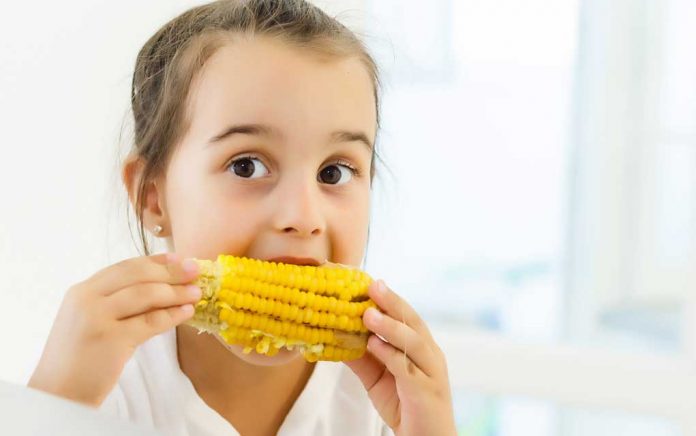
For the past few years, an excerpt from advocate and activist Jeffrey M. Smith's book about the dangers genetically modified (GMO) foods pose to children has circulated virally on the internet. Taken from the book titled, Genetic Roulette: The Documented Health Risks of Genetically Engineered Foods, the excerpt discusses how children are more vulnerable to the effects of GMOs.
There are three main dangers of GMOs mentioned in the article:
- Nutritional changes impact children more because their bodies convert more of the food they eat "to build organs and tissues," but adults convert more food "to energy and store this as fat." Smith mentions the UK Royal Society which said that genetic modification "could lead to unpredicted harmful changes in the nutritional state of foods."
- Children are more susceptible to allergies than adults, with infants having the "highest incidence of reactions, especially to new allergens encountered in the diet." Much smaller doses of toxins can cause reactions in children, and normal development can be "severely affected" by exposure to hormones and endocrine disruptors.
- Children are exposed to many GMOs because they "eat a higher percentage of corn" than adults do. Many infants are given soy infant formula. The majority of corn and soy grown in the U.S. are GMO. However, corn and soy are not the only concerns. Children also consume more milk than adults do, and in the U.S. many dairy cows are given the genetically engineered bovine growth hormone (rbGH) and fed diets of GMO grains (corn and soy).
Read More: 15 Things You Should Know About Monsanto
A 2003 article by University of Minnesota's Division of Environmental Health Sciences discusses the "potential health effects" of GMOs, including the rise of new allergens. Food allergies, according to the article, affect about five percent of children and two percent of adults in the U.S.
Allergic reactions are caused when a protein enters the body and an immune response is stimulated. "If the novel protein in a GM food comes from a source that is know to cause allergies in humans or a source that has never been consumed as human food, the concern that the protein could elicit an immune response in humans increases," the article states.
The article mentions other potential health affects of GMOs, namely increased toxicity, decreased and antibiotic resistance. Some are concerned that inserting an "exotic gene" into a plant could cause it to produce higher levels of toxins that could be dangerous. Others are concerned that a GMO plant could "theoretically have lower nutritional quality than its traditional counterpart by making nutrients unavailable or indigestible to humans."
[Infographic] The 8 Most Common GMO Foods
There are an increasing number of antibiotic-resistant bacterial strains: "Bacteria develop resistance to antibiotics by creating antibiotic resistance genes through natural mutation," the article states. "Antibiotic resistance genes are used as markers when new genes are inserted into a plant. Bacteria living in the "guts of humans[…]could pick up an antibiotic resistance gene from a GMO plant before the DNA becomes completely digested."
The American Academy of Environmental Medicine states that GMO foods "pose a serious health risk in the areas of toxicology, allergy and immune function, reproductive health, and metabolic, physiologic and genetic health and are without benefit."
What can a concerned parent do to protect their children from GMOs? Buy certified organic foods, which do not allow organic foods to be grown from GMO seeds.




